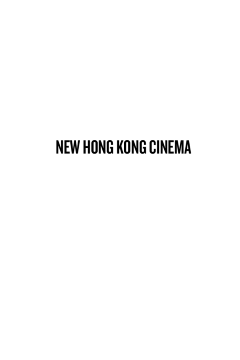
Additional Information
Book Details
Abstract
The trajectory of Hong Kong films had been drastically affected long before the city’s official sovereignty transfer from the British to the Chinese in 1997. The change in course has become more visible in recent years as China has aggressively developed its national film industry and assumed the role of powerhouse in East Asia’s cinematic landscape. The author introduces the “Cinema of Transitions” to study the New Hong Kong Cinema and on- and off-screen life against this background. Using examples from the 1980s to the present, this book offers a fresh perspective on how Hong Kong-related Chinese-language films, filmmakers, audiences, and the workings of film business in East Asia have become major platforms on which “transitions” are negotiated.
Ruby Cheung is Lecturer in Film Studies at the University of Southampton, UK. Her research and publications focus primarily on East Asian cinemas, in particular Hong Kong cinema and the mainstream film industries in the three major Chinese-speaking communities in Hong Kong, mainland China and Taiwan. She is the main editor of Cinemas, Identities and Beyond (2009), and co-editor of Film Festival Yearbook 2: Film Festivals and Imagined Communities (2010) and Film Festival Yearbook 3: Film Festivals and East Asia (2011).
“Cheung successfully conveys the complex and mutable terrain of contemporary Hong Kong cinema, then and now.” · Film Quarterly
“…contextualising these films and filmmakers, New Hong Kong Cinema offers a relevant and insightful reconsideration of contemporary Hong Kong films. Simultaneously, it opens up the possibility for comparative studies.” · New Books Asia
“An impressive and comprehensive work of seminal scholarship, New Hong Kong Cinema is an invaluable contribution to the study of the Chinese film industry in general, and the contributions of the Hong Kong cinema industry in particular. Enhanced with the inclusion of an eight page Filmography; a 28 page Bibliography; and a four page Index, New Hong Kong Cinema will prove to be a greatly appreciated addition to academic library Cinematic History reference collections and supplemental studies reading lists.” · Midwest Book Review
“This book is exciting in its range and subtle in its treatment of texts and contexts. It is a deft combination of film analysis, cultural studies, and socio-economic-political conjunctures that is clearly written and wonderfully researched.” · David M. Desser, Emeritus Professor, University of Illinois
“Cheung makes a compelling case for looking at current Hong Kong film as a 'cinema of transitions.' Moving away from notions of 'crisis' or 'disappearance,' her argument shifts the terms of analysis of Hong Kong film to focus on social, political, and economic change in relation to the fractured and changing identity of Hong Kong's inhabitants.” · Gina Marchetti, University of Hong Kong
